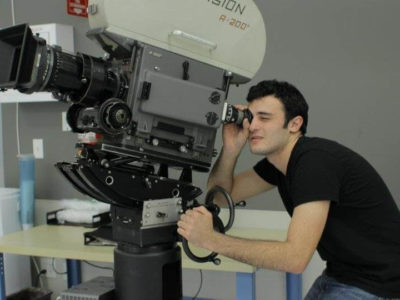Some children grow up watching movies and wanting to star in them, but Joseph Katz, a sophomore film major at the Savannah College of Art and Design, found filmmaking itself to be a much more intriguing prospect.
As such, Katz began his foray into the film industry at a young age, tinkering with digital film in just the seventh grade.
“I made my first video on my cell phone actually about six years ago,” Katz said. “Then my dad got me a camcorder, which allowed me to explore film a little more. By the time I was in high school, I was sure that this was the field I wanted to study and I focused myself on applying to a school where I could pursue it.”
Katz dropped out of high school in his junior year to attend Rockland Community College. Once at school, he began the tedious application process for prestigious film academies and stumbled across SCAD in Savannah, Georgia.
Much to the amateur filmmaker’s surprise, he was accepted into the class of 2014 with expectations running high.
Currently at SCAD, Katz has quickly found that life at a design school can be very different from the average college experience.
“You can’t walk from the dorms to the dining hall without seeing an artist on the floor drawing a sunset, or a filmmaker running with a camera,” Katz said. “Also, most of the parties feel more like social gatherings because they have a lot more conversation rather than blisteringly loud music and dancing.”
In terms of his studies, though, Katz has found his footing within the concentration of directing/producing. The learning curve for this particular field has been a gradual process as familiarizing himself with every aspect necessary to run a smooth operation can take some getting used to.
As with most majors, film is finicky in the sense that what appears ideal on the surface can actually have the opposite effect internally.
According to Katz, when he entered SCAD, he was drawn to the creative facets that came along with directing more so than the nitpicky production side. Yet after spending time in both fields, Katz found his knack for successful producing to be overtly more satisfying, which made him more of an asset in the job market.
However, his newfound appreciation for producing does not diminish the complexities or importance associated with the hefty title.
“What a producer usually does is he organizes the entire shoot and makes sure everything is going according to plan,” Katz said. “Like if you go on a movie set and see a producer, you might think he isn’t doing anything but that’s because he has done 99 percent of his work before even getting to set.”
Katz’s knowledge of the industry may seem uncanny for an unseasoned sophomore, but don’t let his age fool you – he speaks from experience.
While many of his classmates have been honing their skills in the classroom, Katz has been fortunate enough to gain real-world experience working on legitimate sets for the past 8 months thanks to proactive networking. His time on set has certainly changed his views regarding the industry, which may contradict what many believe true today.
“I don’t think that there is any kind of lack of jobs for filmmakers as others are saying,” Katz said. “It’s gopher work but I am 18 and I’m finding it relatively easy to come by in the industry. Moving up is where is gets tricky.”
Moreover, technology has taken this particular industry by storm; what has previously been structured under the traditional film background has now morphed into a purely digital world.
“It has been a really harsh change because all these teachers want to teach film while all the students want to learn digital,” Katz said.
Another shift that has rocked the film industry has been the recent emphasis on web-based products versus conventional cinematography.
“It used to be only shooting full-length films or shorts, now it's all about what you can shoot and put in line that’s 30 seconds and will grab someone’s attention,” Katz added.
While Katz still maintains his dream of one day working on a big movie set, he understands the need to do more commercial endeavors in order to fund his own projects. Similarly, Katz and his classmates are being taught to prepare themselves for the rocky road ahead by making them ready for this new environment.
“Film majors are all doing more work with the web because that’s the direction film is taking, and everyone that thinks ‘oh no, it will always be this way’ is not seeing the big picture,” Katz said. "People never thought we would go to the moon and people never thought that we wouldn’t be shooting on film cameras, but we do. Film may not be what it used to be, but I would love to adapt with it.”



















